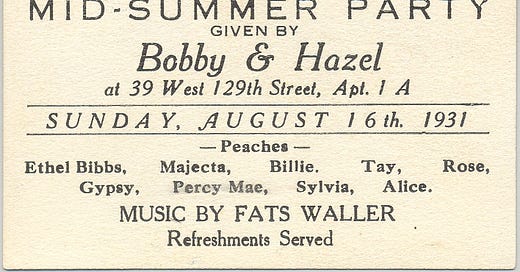Maybe it's time to revive the rent party
Maybe the rent party never went away, maybe we just need to revive how we talk about the ways in which our people use food to provide mutual aid
A few months ago or so, someone posted a video on social media of the inside of a Chicago man’s home, where he sold food. He sold dinners. The person who videotaped the makeshift restaurant wasn’t very kindly, leading me to believe that they were lightweight snitching instead of buying food. But that was my take on them. My take, however, on the vendor was different. I immediately wished the post hadn’t gone viral so the vendor wouldn’t get in trouble with the law. Cottage food laws are strict as are the health laws governing what can be cooked and the conditions of the kitchen. I wanted the man to keep selling and from what the video conveyed, he was selling a lot of plates.
🛑 I am not condoning breaking the law. I am condoning discretion in how we ‘market’ underground activity in the form of selling food. In some states and municipalities, it is against the law to sell food using social media, especially if it is made under unlicensed circumstances. Please tell your friends.
Recent events have revitalized the interest I have in how everyday Black women and men use food to pay the bills and supplement their incomes. It is that interest that led me to move away from working in publicity and marketing to exploring my interest in the foodways as a public historian. Want to hear my passion? This is the topic that will make me talk for hours and correct people on historical accuracy, especially when they don’t give a good hoot. But I wish we would give a hoot. Selling and buying plates and other sourced food is at the root of our survival.
The Rent Party
I have some evidence that rent parties and similar activities took place Down South (Memphis, Atlanta, New Orleans), but in the North, especially during both waves of The Great Migration, rent parties or house-rent parties were normal fare in Black neighborhoods. Most often we associate rent and flat parties (flop-wallies, struts) with Harlem but they happened throughout the North (Philadelphia, Chicago, Cleveland, Detroit…) and were called by different names. And they functioned in all cities in a variety of ways that included eating, drinking, dancing, live entertainment, gambling and (whispering) orgies. You paid an admission fee and what you paid for after that was between you and your hosts.
The purest intention of these parties was to help a family, a single man or woman, or a group of friends pay the rent and bills.
“Sometimes, hosts targeted a specific population, such as Pullman porters, interstate truck drivers, or black tourists. Other hosts simply tucked the tickets into elevator grilles or apartment windows. Drumming up a good crowd was important, for competition was fierce; as many as twelve parties in a single block and five in an apartment building, simultaneously, were not uncommon in Harlem during the 1920s. Although rent parties raged every night of the week, the most popular evening was Saturday, since most day laborers were paid on Saturday and few had to work on Sunday. The next favorite party night was Thursday, when most sleep-in domestic workers were off-duty.” Encyclopedia of the Harlem Renaissance
Growing up in the Midwest, I witnessed variations of the rent party. One of my former neighbors held fish fries in the summer to fund her family reunion and pay her grandchildren’s college expenses. One lady I knew hosted card parties to pay winter utility bills and buy Christmas gifts. And more than one friend cooked dinners in their college dorm rooms and apartments to buy books and essentials.
No matter what it was called and who hosted, people responded to their own need within their communities, and it worked.
My hope is that we consider that as we face uncertain times. As a woman said in a video, “Black folks are always going to eat. We gonna have food.” I venture to say, we’re always going to have a pot and stove, and we’re always going to have one another so why not sup together for a good cause?
Maybe it’s time we rethink rent parties in theory and re-create community in practice, using food and fellowship. I could go for a good party and a plate of food to help someone else keep the roof over their heads. How about you?
Stay tuned, I am going to explore the topic of using food in these times to build community — legally 😉—and provide mutual aid.





Food? Music? Mutual aid in a moment when hardly anybody I know can afford their housing? Sounds good to me! Thank you Robin, for this piece on one of the most vibrant community models we have.
Excellent article! Thank you for thoughtful piece.